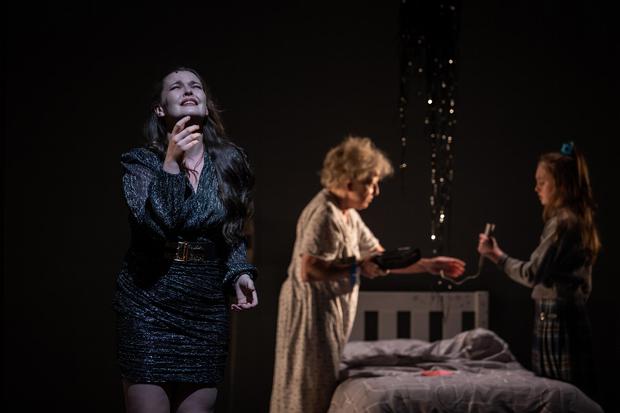Once Before I Go; Gate Theatre until Oct 30
Unmissable story of love, death and the struggle for gay rights
As a critic, I usually confine my attention to what is on the stage, but it is hard to ignore the ghosts of the Gate Theatre’s founders, Hilton Edwards and Micheál MacLiammóir, who haunt this wonderful new play by Phillip McMahon. Their gay life was an open secret in closeted early 20th-century Dublin.
The play is a love story between flamboyant Bernard and square Daithí, set against the background of four decades of the Irish gay rights movement. It opens in 2019 with Daithí and Lynn having a long-delayed confrontation about the death of her brother Bernard almost 30 years earlier. Now 60, they both live in London. Daithí is considering a return to Ireland, having inherited his mother’s house.
We then flash back to 1987, when Daithí, Lynn and Bernard were part of the Irish gay rights movement, campaigning in the shadow of the Aids epidemic. In their different ways, they all give up on Ireland. But they do not give up on love. Lynn moves to London. We follow Daithí and Bernard to Paris, where Aids begins to ravage Bernard, and Daithí stands at his side like a rock.
McMahon’s writing plumbs plenty of emotional depths without ever falling into any of the pathos traps. Bernard succumbs to Aids, but never to self-pity or despair.
Designer Francis O’Connor makes history his plaything with giant colourful numerals signifying the passage of years, paying off in a final terrific visual tribute to romantic love. Director Selina Cartmell carefully balances the serious with the jolly, pushing plenty of razzmatazz buttons. Aisling O’Sullivan and Sean Campion stamp their authority on the stage early on as older Lynn and Daithí, with Martha Breen and Desmond Eastwood respectively charming and heartfelt as their younger selves. In a bravura performance, Matthew Malone as Bernard juggles both the depth and the lightness of the play.
Bernard reconciles himself to death, because in the struggle to be himself, “in the tussle, I found great meaning”. For the audience, there is meaning, yes, but plenty of entertainment too. We don’t often come out of the Irish theatre these days feeling we have encountered an important national play, but that is what we get here. Not to be missed.
Score soars in opera showing the lifelong impact of bullying
The First Child; O’Reilly Theatre
until Oct 9
Donnacha Dennehy’s music has been sometimes upstaged by librettist-
director Enda Walsh’s theatrics. Not in this final part of their trilogy, where the score dominates at every point.
Video of the Day
Sales assistant Karen sells a baby carrier to a man who turns out to be married to a woman who bullied her as a schoolgirl. The couple have just had their first child.
As with Walsh’s recent play Medicine, the lifelong impact of psychological damage inflicted in childhood is the focus. The libretto dialogue is clever: the ordinary chat of a suburban drinks meet-up sung in formal opera works a treat. Karen’s online cat-watching and Tinder-trawling neatly integrate technology into the drama, so much an aspect of this creative collaboration. The visual team of Jamie Vartan (design), Jack Phelan (video) and Adam Silverman (lighting) do not miss a trick, and this Landmark and Irish National Opera production is a feast for the eyes.
Karen’s past as a young girl being bullied by messages on cassette tapes is cleverly dramatised with poisonous pink packages. Young dancer Caia Leseure’s performance includes a superb jerky sequence choreographed by Emma Martin. However, the mime part of the older woman feels too separate from the narrative until the end, and the medical orderly, sung by countertenor Eric Jurenas, is musically brilliant but dramatically unfocused. Subtlety and puzzle-figuring by an audience is a fun part of the theatrical experience, but it can be an annoying distraction too.
Dennehy’s score is tonally audacious without losing its friendliness. The Crash Ensemble musicians are to the fore, the drama on a stage behind. A children’s choir constantly draws the focus back to childhood. The vocal performances are outstanding: Jurenas brings deep emotion to the stage; tenor Dean Power is the delightfully louche Tinder date Gary; soprano Sarah Shine’s Karen expresses the fallout of childhood trauma in a final aria of complex, rich sound. The emotional focus of the show resides powerfully in her damaged person.
Fans of Dennehy-Walsh opera collaborations will encounter much they have admired previously, and if the dramatic narrative is a bit less focused, the music soars even higher.
Sober treatment of rape victim’s experience
Stronger; Smock Alley Theatre
until Oct 9
Geoff Power uses earnest and pure language in his new play to construct a no-frills drama about a woman’s route to emotional peace after being raped. Jan is teaching art to problem teenagers. She takes a particular interest in one young man, Damon, who has some talent and displays some sensitivity. Damon is torn between the bad and good influences in his life: his bullying criminal older brother Zippo and his kind-hearted nan. One day he attacks Jan and rapes her.
Jan endures some of the commonly described fallouts from rape, including a feeling that she has brought the experience on herself and a physical aversion to her husband. She eventually embarks on a session of restorative justice, a process whereby victims and perpetrators of crime confront each other for healing. Mary Murray is a vulnerable, shattered Jan. Marcus Lamb does his best with the underwritten part of the husband. Scott Graham is outstanding as the young perpetrator.
This is a sober subject, soberly delivered. Director Paul Meade relies on the events to carry the drama, but there is not much theatrical invention. It’s one way to tackle this tricky subject, and it does lay bare the issues at stake, but without every really transforming them into art.
Spotlight on the ugly power of a male gang
Duck Duck Goose; Pavilion, Dún Laoghaire
Draíocht, Blanchardstown until Oct 9, tours nationwide until Oct 23
Caitríona Daly’s new play for Fishamble: The New Play Company is a dramatically sophisticated tackling of contemporary stories about rape, WhatsApp groups and the ugly power of the male gang.
A terrific set and lighting design by Paul Keogan is all in shades of grey, just like the plot. It encompasses five giant mobile-phone frames, one of which flickers to life with images and messages. Jane (Caitríona Ennis) meets Chris (Aidan Moriarty) after a party. She is agitated and accuses one of his friends of rape. Chris doesn’t believe her but deletes a toxic, macho WhatsApp exchange all the same, and this implicates him in the ensuing criminal case.
Then — and this is the clever structural part of the play — Chris starts to see Jane in every girl he meets. Daly’s script adopts an ethereal quality, where characters repeat lines and embody people other than themselves — a device that contemporary theatre has learned from French dramatist Florian Zeller.
Jim Culleton’s pacey direction keeps tension high. A sparkling performance from Ennis as Jane in her various manifestations is countered by Moriarty’s bravely low-key Chris. This particular subject is well-trodden dramatically, but Daly’s play does bring especial focus to toxic social contexts, and its structural complexity gives it an impressive sheen.










